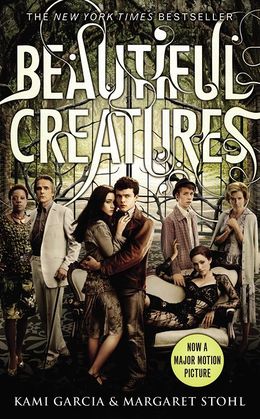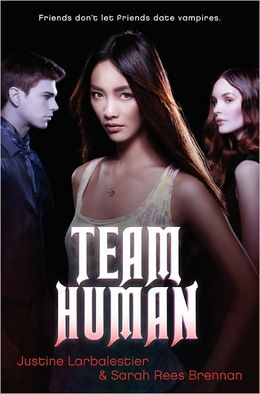Since I first wrote about teen paranormal romance–the spark that became a blaze with the Twilight series and all its imitators–we’ve seen the entire Bella-Edward saga translated to film. Yesterday another big-screen treatment of human/inhuman love opened: Beautiful Creatures, based on a wildly popular YA series that somehow escaped my notice. I’ve  tried to find out all I can about these books without actually reading them, an enterprise in which Wikipedia comes in handy. But fortunately, Gina Dalfonzo (who contributed to Emily’s podcast on Wednesday) read them and posted a helpful review on Breakpoint. I defer to her, and add a few thoughts below:
tried to find out all I can about these books without actually reading them, an enterprise in which Wikipedia comes in handy. But fortunately, Gina Dalfonzo (who contributed to Emily’s podcast on Wednesday) read them and posted a helpful review on Breakpoint. I defer to her, and add a few thoughts below:
The first volume of the series, which goes on to include Beautiful Darkness, Beautiful Chaos, and Beautiful Redemption, was originally published in 2009 to warm reviews and thousands of enthusiastic readers. Like all good examples of a genre, it has its own peculiarities, and I spot two right on the surface: 1) it’s narrated from the boy’s point of view (and generally in all these books, the pov is that of the “normal” character, or at least the one who thinks he or she is normal), and 2) it’s drenched in the swampish atmosphere of southern gothic. Kami Garcia and Margaret Stohl cut their literary teeth on Eudora Welty, Flannery O’Connor, and especially Harper Lee. Both authors count To Kill a Mockingbird high on their list of all-time favorites. There are Mockingbird echoes in Beautiful Creatures, such as a reclusive character who combines elements of Boo Radley and Atticus Finch.
The writing style is superior to many books of this genre, but the plot matter is suspect. The main thread follows Ethan Wate, a likeable, deeply dissatisfied high-school sophomore, and his irresistible attraction to Lena Duchannes, the “new girl” from a very, very old family. Lena’s family is a big issue: they are “Casters,” which sounds to me a lot like witches, and part of their ancestral tradition is that on every daughter’s 16th birthday, she will be “claimed” for either light or darkness. Lena’s own mom is on the dark side, which sets up the mother of all mother/daughter conflicts. Played out in a very small town, the focus is intense and (judging by book excerpts and movie trailers) claustrophobic. It looks like yet another example of romantic love being asked to carry a much heavier burden than God ever intended for it to.
I don’t recommend either seeing the movie or reading the book(s), but that doesn’t mean there is no value in them. My main concern, besides glamorizing supernatural (and unlawful) power, is that they spiritualize romantic attraction. What we call “love” is certainly very powerful in its time, and beautiful in its place. But in teen romances, and especially teen paranormal romances, love literally conquers all, even though the costs may be great. This is a model girls are especially vulnerable to (He needs me! I can save him!), and those who are ill-prepared can be seduced by it, to their life-long detriment.
The best defense against unrealistic expectations is providing good examples of mature, broad-based love (i.e., that which is not built on sexual attraction alone). If you haven’t already, grab a cup of coffee and settle in to listen to Emily’s chats with Rosalie DeRosset last week, and Gina Dalfanzo and Rea Berg (of Beautiful Feet Books) this week. All these ladies have excellent insights on virtuous romance and how traditional literature can help create godly expectations.
When it comes to contemporary literature, the bag is very mixed, as we labor to show here at RedeemedReader. Our goal is to help to build discerning readers. Discern is an interesting word: the Latin root word means to “distinguish, separate, or determine,” and one great intellectual failure I see in our culture today is a refusal to make distinctions. This goes for Christians as well as unbelievers: we all have our hot buttons and red flags, which may blind us to silver among the dross. Truth can be found anywhere, though it’s another issue whether it’s worth your time to mine it. But with that in mind, here’s an interesting addition to the paranormal genre:
 Team Human, by Justine Larbalestier and Sarah Rees Brennan. Harper Teen, 2012, 344 pages. Age/interest level: 15-up.
Team Human, by Justine Larbalestier and Sarah Rees Brennan. Harper Teen, 2012, 344 pages. Age/interest level: 15-up.
New Whitby, Maine, is known as Vampire City. This doesn’t mean the place is crawling with vampires, or that you have to watch your neck. They usually keep to themselves, and Mel is fine with that until her best friend Cathy falls hard for vampire heartthrob Francis Duvarney. “Of course [Cathy] thinks vampires—since many of them are older than dirt and thus basically history books with legs and fangs—are totally fascinating.” Mel knows this can’t turn out well, but soon it’s even worse than she imagined when Cathy decides to transition to the undead world in order to be with Francis forever. Not that Mel is a bigot: “It’s not about being prejudiced. Loads of girls won’t date a guy shorter than they are. Or won’t date a guy with red hair. I won’t date a guy with no pulse.” A parallel subplot concerns Mel’s other friend Anna, whose psychologist father has run off with one of his “transitioned” patients, and now Anna’s mother, the high school principal, is acting very strange.
This book is very strange—a satirical sendup of the paranormal genre with some serious points. Some of those points are pretty banal, like accepting all lifestyles as equally valid (with obvious implications for contemporary society—for of course, one character turns out to be gay). There’s a thread of social commentary and a thread of genuine horror but as a whole it’s really funny (which blunts the horror). The satirical angle induced me to read it, but I didn’t expect to be affected by some parts of it. Such as when a character explains why some humans who choose to transition don’t take it well: “They can’t live without the sun, without laughter, without pain. I know that sounds odd. A life without pain sounds great, doesn’t it? But too many of our patients say it leaves them empty, feeling nothing at all.” So . . . love sometimes doesn’t conquer all?
Toward the end of the novel, Mel’s worst fears are met and dealt with, and she expects this will change Cathy’s mind. But it doesn’t. The implication is that Cathy’s decision may not be good for anybody else, but it’s best for her. I don’t buy into that kind of relativism, but I do know the agony of seeing someone make a bad decision when the case against it seems plain—and no word of wisdom or pleading or tears will change their mind. That’s exactly what Mel feels, and her quandary is touching, even if her conclusion is false. Not a blanket recommendation, but Team Human sheds some light into what it means to be human, and that’s what literature is all about.
We’ll have to revisit this genre again in September, when City of Bones, the first installment of Cassandra Clare’s Mortal Instruments series, hits the silver screen. Some of our readers have asked about the Mortal Instruments novels. From what I’ve seen of them, I’d suggest you stay away: their redeeming qualities are not evident. (Here’s a link to our movie review.)
Support our writers and help keep Redeemed Reader ad-free by joining the Redeemed Reader Fellowship.
Stay Up to Date!
Get the information you need to make wise choices about books for your children and teens.
Our weekly newsletter includes our latest reviews, related links from around the web, a featured book list, book trivia, and more. We never sell your information. You may unsubscribe at any time.
We'd love to hear from you!
Our comments are now limited to our members (both Silver and Golden Key). Members, you just need to log in with your normal log-in credentials!
Not a member yet? You can join the Silver Key ($2.99/month) for a free 2-week trial. Cancel at any time. Find out more about membership here.
3 Comments
Leave a Comment
You must be logged in to post a comment.


“Truth can be found anywhere, though it’s another issue whether it’s worth your time to mine it.”
That is perfectly put! So succinct, yet absolutely true. And you just clarified for me what has always been the reason I choose, or don’t choose, to read certain books. A 3-day/week school librarian who loves children’s literature just doesn’t have time to read everything she should…
And the other problem, of course, is whether the child will have enough knowledge of truth to find it if it is hidden…
I love how you comment on the tendency of romantic love to become paramount in the supernatural romance sagas… When one is looking for something to worship, passionate and tantalizing love is an easy idol to cling to until it fades or the rug is pulled out from under you! Great thoughts Janie.
“It looks like yet another example of romantic love being asked to carry a much heavier burden than God ever intended for it to.”
That’s well put.